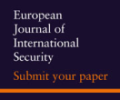European Journal of International Security, Issue 2:2 (forthcoming).
By Campbell Craig, Cardiff University
Marxism, once a venerable theory of international relations as well as all other realms of politics, fell well out of fashion following the collapse of the Soviet Union and almost complete disappearance of state socialism over the past 25 years. Recently, however, Justin Rosenberg and other scholars have sought to revive Marxist IR, arguing that its theoretical tools can still help us to understand contemporary international politics irrespective (or perhaps now more than ever because) of the demise of the USSR.
Specifically, Rosenberg contends that Leon Trotsky’s theory of ‘Uneven and Combined Development’ gives us a ready means of accounting for international conflict that surpasses even structural realism in its explanatory power. Realism sees states as autonomous units, all seeking security just like everyone else; Trotsky replies that they are not autonomous, but rather are intertwined economically with one another (‘combined’), and that they are not all the same, but face off against one another in wildly different states of economic development (‘uneven’). Because economic interaction among states in a capitalist world and their pursuit of development is a constantly dynamic and uncertain process, intensified even further by sudden technological innovations, conflict among them is convulsive, with states endlessly finding themselves racing to keep up with another. If many realists see interaction among states as test cricket, Uneven and Combined Development is more akin to Formula One.
Central to Trotsky’s, and Rosenberg’s, theory is the idea of the ‘Whip of External Necessity,’ Trotsky’s term for the pressure upon states to develop their economies quickly lest they find themselves militarily outmatched by their neighbours. States pursue rapid development not only to secure wealth, but to build the latest weaponry and deploy large armies so that they are not crushed in the next war. Like realists, Trotsky regards the pursuit of security as a state’s most urgent objective and one it must risk war to assure; he just argues that the uneven economic connections among these states intensifies this conflict and indeed makes it inevitable, until the final victory of world socialism.
What does this mean in a world of nuclear weapons? My article seeks to answer this question, by using both historical and theoretical argumentation. First, I trace the notion of ‘inevitable war’ in Marxist-Leninist ideology, and show how the Soviet leader Nikita Khrushchev recognised in the 1950s that nuclear weapons made war suicidal and so the idea of inevitable war unacceptable, leading him to advocate instead ‘peaceful coexistence’ with the West. Faced with the choice of adhering to Marxist ideology or steering clear of World War Three, Khrushchev opted for the latter.
Second, I argue that the implications of nuclear war which Khrushchev perceived must be confronted if Uneven and Combined development is to speak to contemporary international politics. If, according to Uneven and Combined Development, conflict and war among large states is inevitable (until the victory of socialism), then this would foretell a nuclear war and the possibility of apocalypse it brings. If it is not inevitable—i.e., if war can be avoided indefinitely—then Trotsky’s (and Rosenberg’s) conception of international politics would have to be modified to exclude major war, a move that would deprive the Whip of External Necessity of all of its original meaning. This is an inescapable dilemma, because Trotsky’s conception of Uneven and Combined Development is one of historical process, whereby war and conflict obtains among capitalist states until the day of socialist triumph. If such a war instead simply killed off the human race, his formula would no longer make sense, which is essentially what Khrushchev figured out sixty years ago.
Rosenberg and other Marxist IR theorists, I insist, cannot get around this problem. Either they have to argue that a nuclear war still is politically thinkable and would not destroy humanity, or they have to admit that Uneven and Combined Development, and especially the idea of the Whip of External Necessity, has been made obsolete by nuclear weapons.
In the conclusion, I introduce a way to address this dilemma. Trotsky and other Marxist-Leninists during the twentieth century embraced the idea that the interstate system was a fact of international life, and that indeed the global victory of socialism could be achieved by locating socialism in ‘one country’ (e.g. the USSR) and using it as a base to spread the revolution.
That was an utter failure. What is more, as scholars such as R.N. Berki have pointed out, this embrace of the nation-state defied Marx’s original arguments that the state was a product of the capitalist order rather than something to be used to overthrow it, and, furthermore, that his socialist vision foresaw the erosion of national borders and the development of human solidarity rather than an endless pitting of one country against another. This aspect of his theorising was dismissed by his successors as too utopian in an age of world wars and a constant battle for national survival. Now that such wars portend nuclear extinction, however, Marxist IR theory may be forced to return to such supranational ideals.
Campbell Craig is Professor of International Relations at Cardiff University.




No comments yet.